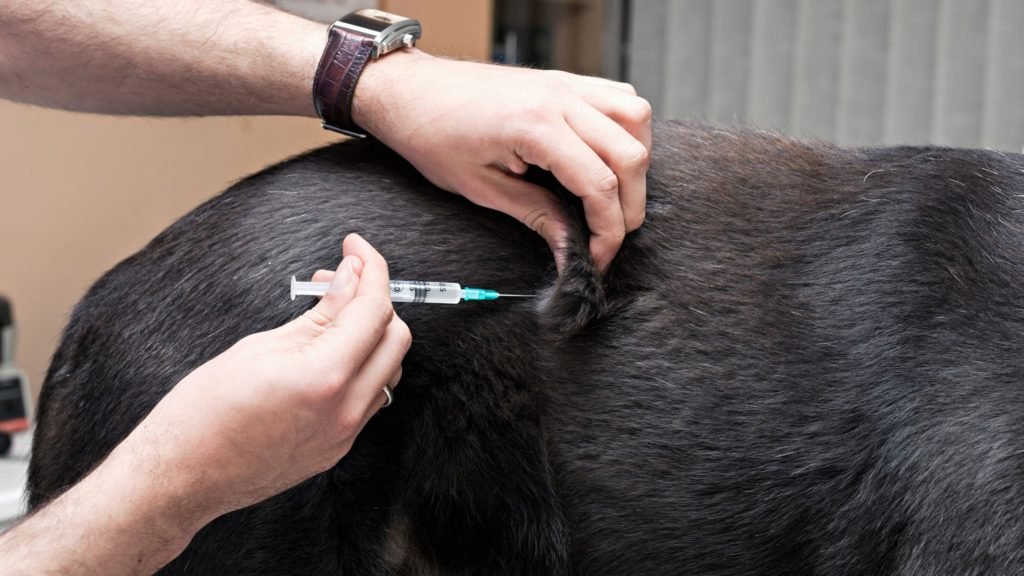Leptospirosis in dogs is caused by spirochetes, slender, spirally undulating bacteria. Canicola, Icterohemorrhagiae, Grippotyphosa, and Pomona are at least four species of leptospira bacteria (or serovars) that can infect dogs.
What Causes Leptospirosis in dogs
Both wild and domesticated animals can harbor Leptospira, a bacterium spread in urine that can remain infective in soil for up to six months. Rats, pigs, raccoons, cattle, skunks, and opossums are the primary reservoirs. Contact with pet dogs may be the cause of leptospirosis upswing as housing spreads into the suburbs. Dogs at increased risk include those who spend time in water or drink from puddles or yards with runoff, as the spirochetes enter through breaks in the skin or contaminated water.
Signs of Leptospirosis in dogs
Leptospirosis can make dogs sick. Signs appear 4 to 12 days after getting infected. Early signs include fever, loss of appetite, vomiting, and feeling tired. Dogs may also have muscle pain, diarrhea or bloody urine. Leptospirosis can affect the kidneys or liver, and in severe cases, turn the whites of the eyes yellow. This means the liver cells are being destroyed. It can also cause bleeding from the mouth and blood in the stools.
You May Also Interest: All You Need to Know About Brucellosis in Dogs
Following recovery
Dogs who don’t get treatment can spread the bacteria in their pee for up to a year. Some types of the bacteria hurt the kidneys or liver. Young dogs often have liver damage. Doctors can check if a dog has leptospirosis by looking for certain signs like kidney and liver problems, or by testing their pee and blood.
Treatment and Prevention
Treatment
If a dog is very sick with leptospirosis, they may need to go to the hospital for special care. The doctor may use antibiotics like penicillin and streptomycin to treat the illness. Other drugs like enrofloxacin or ciprofloxacin could help too. The doctor can also give the dog fluids to keep them from getting dehydrated and help them eat.
Prevention
To prevent leptospirosis, there is a vaccine that can help stop the bacteria from spreading. People can also get the disease, so be careful around infected water or pee. Even dogs who don’t look sick can still spread the infection.
Leptospirosis vaccine for dogs

To prevent Leptospirosis, make sure to vaccinate your puppy at the right time with the right shots. Vaccines work best when given on a schedule with booster shots. The puppy’s vaccination program usually starts when they are 6 to 8 weeks old. The leptospirosis vaccine will be given more often when they are 11 to 13 weeks old, with a booster at 15 to 17 weeks.
After the puppy gets their second set of shots, they will be protected against Leptospirosis.
You May Also Interest: Understanding Bordetella in Dogs and Treatment Options
FAQ about Leptospirosis on dogs
How can I know if I should vaccinate my puppy?
Vaccines provided to puppies are mandatory and recommended. The leptospirosis vaccine is required, so it will always be administered to your puppy as part of the vaccination program established by your veterinarian.
Will the vaccine always cover my dog against Leptospirosis?
With certain diseases, including Leptospirosis, there are a large number of agents involved in the infection. The vaccine protects against the agents that are considered the most important but not against all.
Once vaccinated, your puppy can still develop the disease if it comes into contact with different strains against which the vaccine has no effect. To protect it against spreading diseases, it must receive a booster shot every year.
What should I do if I think my dog has Leptospirosis?
If your puppy starts showing any symptoms of Leptospirosis, you should consult a veterinarian immediately. Since its contagious, humans must treat this virus with care. Are recommended to wear protective gloves. Your veterinarian will require a complete medical history and lifestyle of your puppy. He will perform various exams, including blood profiles and urine analysis, to determine if your puppy has contracted Leptospirosis and recommend the best treatment approach.
Regardless of the possibility of your dog contracting certain diseases, you should always ensure they have all the required immunizations. They examine their lifestyle with your veterinarian to ensure they receive the recommended vaccines.
What is a Lepto Vaccine for dogs?
The Lepto vaccination is a name people use to identify the Leptospirosis vaccine for dogs.

